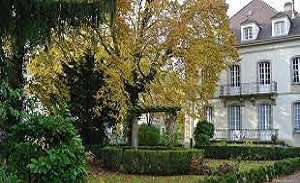trasbourg institute invites Lutheran pastors for online seminar on ecumenism
Annual course on interreligious dialogue will also be online
 (LWI) - The Institute for Ecumenical Research in Strasbourg, France, will offer its recently introduced ecumenism study seminar online, this time focusing on the self-understanding, “to be Lutheran is to be ecumenical.”
(LWI) - The Institute for Ecumenical Research in Strasbourg, France, will offer its recently introduced ecumenism study seminar online, this time focusing on the self-understanding, “to be Lutheran is to be ecumenical.”
The Lutheran World Federation (LWF) will co-host the 4-9 October online course, which invites applications especially from parish pastors and students who have advanced knowledge in Lutheran theology. The “Studying Ecumenism in Strasbourg!” inaugural course in 2019 was held in person, bringing together theologians from LWF member churches around the world. The COVID-19 restrictions make it impossible to meet in person this year.
Ecumenism has been part of the regular seminars the institute offers. However, “the specific focus on the Lutheran confessing tradition as ecumenical opens up new avenues for deepening an understanding of Lutheran identity and its call to witness to God’s ongoing reconciling action in the world,” says Prof. Dr Dirk Lange, LWF Assistant General Secretary for Ecumenical Relations.
Outcomes of LWF’s ecumenical dialogues spanning more than 60 years will feature prominently. Study topics include historic agreements such as the 1999 Joint Declaration on the Doctrine of Justification with Catholics, which at its 20th anniversary had developed into a multilateral partnership with the Methodist, Anglican and Reformed communions. The bi-lateral dialogues with the Mennonites, the Orthodox and Pentecostal churches will also be discussed, as well as regional and national agreements.
The specific focus on the Lutheran confessing tradition as ecumenical opens up new avenues for deepening an understanding of Lutheran identity and its call to witness to God’s ongoing reconciling action in the world.
— Prof. Dr Dirk Lange, LWF Assistant General Secretary for Ecumenical Relations
The engagement of Lutheran churches with other Christian traditions will be part of the curriculum, and the pastors and theology students representing all the seven LWF regions are expected to report on such relations in their respective countries. The aim of this exercise is to incorporate contemporary experiences in developing concepts and tools that help to describe and analyze ecumenical situations in local contexts.
The deadline for applications is 31 July 2021.
Annual international seminar
Meanwhile, the annual 54th international seminar will also be held online, 5-10 July, focusing on the similarities and differences between ecumenical and interreligious dialogues. Participants will examine how experience from churches can build bridges between ecumenical work and other intrareligious engagements, such as within Islam.
Prof. Dr Jennifer Wasmuth, the Strasbourg Institute director, says she is looking forward to the many experiences that seminar participants often bring along and the lively exchange with the teaching experts. “Interreligious dialogue is an important future topic for us as Lutheran churches and for our societies. In the seminar we want to make LWF’s rich experience with ecumenical dialogues fruitful for encounters with other religions,” she noted.
Both study courses will be held in English. Up to 60 people can participate in the July seminar, while the October course is limited to 20 participants.
By LWF/P. Mumia
Source: lutheranworld.org/

